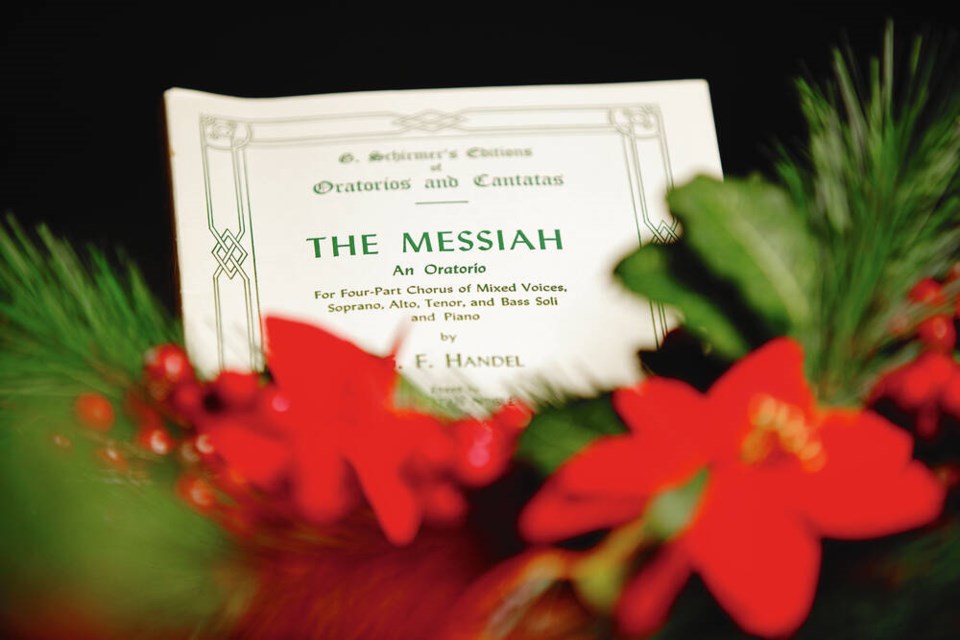HANDEL’S MESSIAH
Where: Farquhar Auditorium, 3800 Finnerty Rd., University of Victoria
When: Friday, Dec. 15, 7:30 pm; Sunday, Dec. 17, 2:30 p.m.
Tickets: $56-$76 from or 250-721-6561
No one has to remind Giuseppe (Joey) Pietraroia of the high stakes involved where Handel’s Messiah is concerned. He’s keenly aware.
Pietraroia, an associate conductor with the Victoria Symphony, has been at the helm of productions of Handel’s popular Christmas classic each year since 2018, so there’s a sense of familiarity with the German composer’s lauded English-language oratorio.
“A lot of it is in my brain, and can be done where I’m not even looking down at the score,” Pietraroia said. “But at the same time, I try not to make it routine, almost like a paint-by-numbers Messiah. Just because I’ve done it a certain way all these years doesn’t mean I can’t take a fresh look at it.”
Though he wants to keep annual productions of Messiah fresh, he isn’t overly concerned with renovating the estimable Hallelujah chorus, which has enthralled audiences since the composition’s debut in 1741. He tinkered with it for the first time in his career last year, and was happy with the results. But he thought it would be best to leave well enough alone this year.
“Rather than start out with a full-voice Hallelujah, I started it quite softly, and built into it. I was seeing it almost like a chorus of angels coming from the distance. Building up to a bigger Hallelujah, rather than coming in full force at the beginning. Everybody seemed to enjoy that.”
The revisions remain in place for performances on Friday (7:30 p.m.) and Sunday (2:30 p.m.) at the Farquhar Auditorium, which pairs the Victoria Symphony with the 100-voice Victoria Philharmonic Choir, led by music director Peter Butterfield.
Handel compositions lend themselves to interpretation, Pietraroia said — phrasings, dynamics, and the like; that keeps one of the most-performed productions (locally and abroad) in history as relevant as possible, he added. The conductor will have help this week in the form of four guest soloists from Toronto, Mireille Asselin (soprano), Simona Genga (alto), Andrew Haji (tenor), and Stephen Hegedus (baritone), who appear throughout the two-hour performance.
Hegedus has joined the Victoria Symphony for previous productions, but his cohorts are embarking on their maiden Messiahs in Victoria. None of the guests are new to their roles, however. “There are certain singers who have Messiah in their repertoire, and they do Messiah tours that start in early December out East and then fly out here. Their whole salary for the years is based on the number of Messiahs they do in December.”
Messiah is a cottage industry, no doubt. Up to a dozen performances of it are staged each year on 91原创 Island, the bulk of which either sell out or come close to capacity, despite the fact it was written to be performed around Easter, not Christmas (the Hallelujah chorus is about the resurrection of Jesus).
“It became a North American Christmas thing in the 1960s or ’70s,” Pietraroia said. “In Europe, it is still associated more with Easter than Christmas.”
The annual production was held in years prior at Christ Church Cathedral but had to be moved due to demand. The Victoria Symphony may return there in the near future, Pietraroia added, but the Farquhar Auditorium, which can seat more than 1,200 guests, was chosen years ago for its spaciousness, strong acoustics and sightlines, and ability to accommodate more than 150 performers on stage.
There is nothing small-scale about Messiah, so every inch of the University of Victoria theatre will be used during the two performances. Pietraroia said he is ready for what lies ahead.
“It’s not physically difficult. It’s not a challenge in terms of technique. It’s about mental energy and being able to stay focused. In order to do that, it’s about your mental readiness.”



